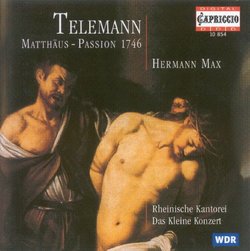| All Artists: Georg Philipp Telemann, Hermann Max, Das Kleine Konzert, Veronika Winter, Bernard Scheffel, Christoph Bermester-Streffer, Sebastian Hübner, Wilfried Jochens Title: Telemann: Matthäus-Passion, 1746 Members Wishing: 0 Total Copies: 0 Label: Capriccio Release Date: 11/18/2002 Genre: Classical Styles: Opera & Classical Vocal, Sacred & Religious Number of Discs: 1 SwapaCD Credits: 1 UPCs: 4006408108542, 845221002514 |
Search - Georg Philipp Telemann, Hermann Max, Das Kleine Konzert :: Telemann: Matthäus-Passion, 1746
 | Georg Philipp Telemann, Hermann Max, Das Kleine Konzert Telemann: Matthäus-Passion, 1746 Genre: Classical
|
Larger Image |
CD Details |
CD ReviewsSerene Passion Giordano Bruno | Wherever I am, I am. | 08/30/2009 (5 out of 5 stars) "Does all Baroque 'recitativo' sound alike to you? Stiff and formulaic? Apparently Georg Philipp Telemann was dissatisfied with it also, chiefly because the strict 4/4 rhythm inherited from Italian composers forced Germans to distort their language of irregular stresses in a manner that compromised its expressiveness. Listen carefully to this Passion of 1746 (Telemann wrote numerous passions, by the way, but this one is my favorite) and you'll hear a narrative of the events of 'Holy Week' as told in the Gospel of Matthew that is anything but stiff. Rather than a segmented series of set pieces, however fine, you'll hear a flowing, unified work in which all the elements - recitation, aria, chorale, and brief electrifying polyphonic outbursts from the chorus reminiscent of Heinrich Schütz's Passions - are integrated as no composer had achieved before.
Telemann's enormous innovation in this Matthäus-Passion was to apply insights he'd gathered from the French style of recitativo to his German text. French is a markedly less 'stressed' language than either Italian or German; to achieve the freedom of French recitativo, Telemann took the bold step of scattering various time-signatures, hence various rhythms, throughout his recitativos. This is a rather technical matter, but fortunately it's described thoroughly, if you care, in the notes that accompany the CD. Of the 52 tracks recorded here, eight are formally da capo arias of varying length and six are harmonized chorales, meaning that the whole composition is preponderantly recitativo. But Telemann shifts freely from 'seco' (dry; with minimum continuo) to orchestrally accompanied recitativo, seamlessly to 'arioso' (melodious recitativo), and effortlessly to aria or chorale; the result is a serene musical current of joy. Yes, joy! A most appropriate emotion for the tale of mankind's supposed salvation through vicarious atonement! The arias and chorales, as was the usual practice, are not scriptural, but Telemann has expressed his 'spiritual' intention by selecting poetic texts that emphasize secure belief and comforting confidence. This recording sounds to me like a live performance. The choir is slightly muffled in enunciation, and there are a few odd thumps to be heard. But it also has the energy of a successful live performance. All the voices of the Matthew narrative are male, with basso Klaus Mertens singing a manly Jesus and tenor Wilfried Jochens singing an eloquent Evangelist. Tenor Sebastian Hübner deserves applause for his ringing aria in the role of Petrus. Most of the other arias are sung by women - soprano Veronika Winter and alto Carmen Schüller inter alia - whose sweet musicality matches the serene affect of the aria texts. This is not a work of massive greatness like Bach's Matthew Passion, but it IS a work of great music. I'll bet it held the congregation rapt." |

 Track Listings (52) - Disc #1
Track Listings (52) - Disc #1